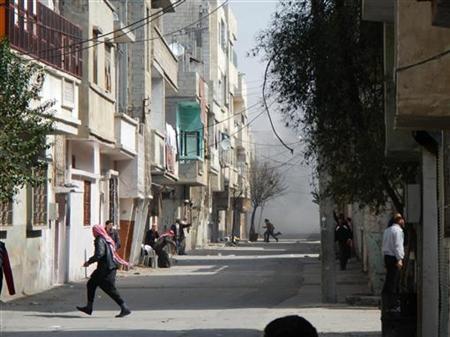By Khaled Yacoub Oweis
AMMAN (Reuters) – Heavily armed forces loyal to President Bashar al-Assad battled rebels in the southern city of Deraa on Wednesday, while U.N. envoy Kofi Annan considered Syria’s response to plans aimed at ending the violence.

Around 20 tanks and armoured vehicles surrounded the al-Balad district of Deraa, on the border with Jordan, and fired anti-aircraft guns into buildings, activist Rami Abdelhaq said from Deraa, where the revolt against Assad began a year ago.
Annan visited Damascus at the weekend and gave the Syrian president what he termed “concrete proposals” aimed at restoring peace. Assad’s response had been received and Annan was studying it, his spokesman Ahmad Fawzi said.
“The envoy has received a reply from President Assad. He will have more to say later today,” Fawzi said from Geneva.
Since the former U.N. chief’s visit, the violence has continued unabated, with Syrian forces pounding built-up areas around the northern city of Idlib, in the central city of Homs and in the south, around Deraa.
“The attack began early this morning. The rebels are firing back, but they are outgunned,” said Abdelhaq, speaking by phone, with the sound of heavy gunfire echoing in the background.
A U.N. official has said more than 8,000 people have died in the uprising and the U.N. refugee agency said on Tuesday that some 230,000 Syrians had fled their homes during the past 12 months, of whom around 30,000 have sought safety abroad.
In an apparent bid to deter the exodus, Syrian forces have laid landmines near its borders with Lebanon and Turkey along routes used by refugees to escape the mayhem, advocacy group Human Rights Watch said.
The United Nations says Assad’s forces have killed more than 8,000 people in their drive to crush the uprising. Its refugee agency said on Tuesday that some 230,000 Syrians had fled their homes during the past 12 months, of whom around 30,000 have sought safety abroad.
The authorities say rebels have killed 2,000 soldiers. The turmoil, coupled with Western sanctions, has cost Damascus billions of dollars in lost revenue from crude oil sales and tourism receipts. The Syrian pound has halved in value, foreign investment has dried up and trade has collapsed.
While Western powers and much of the Arab world have slammed Assad’s bloody crackdown, Syria has been able to count on the support of both Russian and China, which have vetoed two U.N. resolutions that were critical of Damascus.
COMPLEX REPLY
Chinese Premier Wen Jiabao said on Wednesday that Beijing was taking no sides in the crisis, and that he was “deeply pained” by the suffering of the Syrian people, though his remarks did not suggest China’s diplomatic position will change.
Earlier, state media said China would offer $2 million in humanitarian aid through the Red Cross.
Wen threw his weight behind Annan’s efforts to end the crisis. The veteran diplomat presented Assad with a five-point plan, including a demand for an immediate ceasefire and dialogue with the opposition.
A Middle East diplomatic source said the Syrians wanted further clarifications. “Assad’s answer was that if you specify to us who is the other side, and who is responsible for this and how will they commit to a ceasefire, we are ready,” he said.
“The Syrians are dealing seriously with Annan. There is not a ‘no’ but they are discussing some of the points they are not convinced about … The reply that Annan gets will need a week to understand,” he added.
Looking to show the world that it was pressing ahead with a reform programme, the Syrian parliament said on Tuesday that Assad had ordered a legislative election for May 7.
The U.S. State Department was dismissive.
“Parliamentary elections for a rubber-stamp parliament in the middle of the kind of violence that we’re seeing across the country? It’s ridiculous,” spokeswoman Victoria Nuland said.
The United Nations said on Tuesday that it would soon deploy human rights monitors in countries bordering Syria to collect eyewitness testimony on atrocities committed in the country.
Amnesty International said Syrians detained during the uprising had been subjected to widespread torture that amounted to a crime against humanity.
The rights group said in a report that Syria should be referred to the prosecutor of the International Criminal Court. However, only the U.N. Security Council can do that, and it remains divided.
“The testimony presented in this report … is yet further evidence that torture and other ill-treatment in Syria form part of a widespread and systematic attack against the civilian population,” Amnesty said.
Syria lies in a pivotal position, bordering Turkey, Jordan, Israel, Iraq and Lebanon. Its 23-million population comprises a mix of faiths, sects and ethnic groups, and analysts say the gathering conflict could destabilise the entire region.
(Writing by Crispian Balmer; Additional reporting by Ben Blanchard in BEIJING and Yasmine Saleh; Editing by Daniel Magnowski and Michael Perry)

